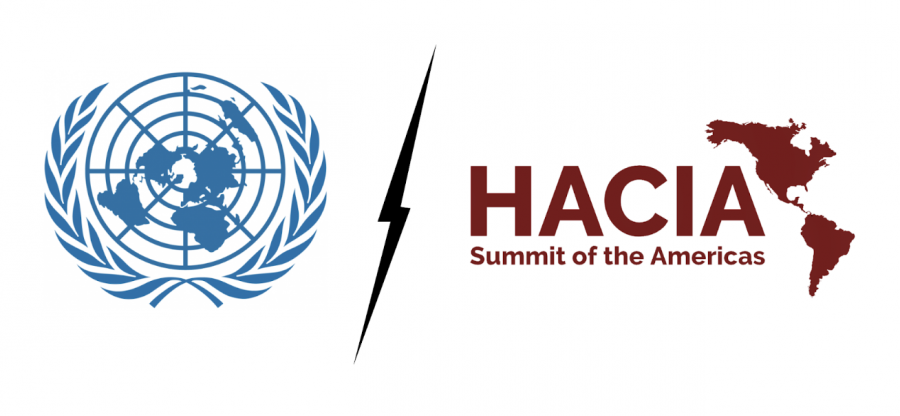MUN and HACIA: Choose the best one for you
Many Graded students share an interest in public speaking and debate. MUN and HACIA, both Graded clubs, give international students the opportunity to do so in a diplomatic environment. However, students are only allowed to take part in one, and when it comes time to choose, they are usually uninformed of their differences. In order to help those who are struggling to make a decision, The Talon set out to explore what sets them apart.
HACIA (The Harvard Association Cultivating Inter-American Democracy) is a simulation organized yearly by Harvard students focused on cultivating debates over Latin American issues and providing an opportunity for students to find solutions to those problems (“About”). Graded HACIA club holds its weekly meeting Tuesday after school, led by three High Schoolers, Paula Fernandez, Lucas Marangoni and Cristina Krueger, and two teacher advisors, Marcello Bulgarelli and Guillermo Loyola.
Similarly, MUN-Model United Nations is a simulation for students to learn more about democracy, international relations, and global problems. What sets them apart, however, is the vast number of conferences that take place yearly all over the world (“Model”). Here at Graded MUN is also held on Tuesday’s afterschool and is coordinated by four student leaders: Ms. Accomazzo and Ms.Giltner supervise Alyssa Ting, Olivia Peixoto, Sofia Amato, and Samuel Bowles.
Aiming to understand the differences of each club better, The Talon set out to interview students with leadership positions in both programs.
Both Olivia (MUN) and Lucas (HACIA) explained that these debate clubs help develop public speaking and debate skills. They have the same overall principles and aim for the same outcomes. However, while HACIA focuses on Latin America, MUN explores global problems.
Another critical difference is that HACIA has only one conference a year, while MUN has several conferences throughout the year. Olivia explained that MUN has “six conferences a year, three per semester, and two travel conferences (one to UPenn and the other to Bahia). In each conference, members represent different countries in specific committees, where they are assigned two-three topics to research and debate over four days.” Marangoni, on the other hand, said, “we have one huge conference in March, organized by Harvard students, where several schools come together from all across Latin America to debate different topics. There are committees both in English and Spanish with the number of people in each one ranging from fifteen to sixty students.” Similarly, both allow students to travel outside the country and get to know new places. Also, both require lots of work for each conference to get to know your topic and your country. Furthermore, they both require practice for procedures and acquiring debate skills.
Moreover, both have weekly meetings, but they are structured in different ways. As MUN has more conferences than HACIA, meetings for MUN usually “center around preparing students for upcoming conferences,” as Olivia told us. For HACIA, Lucas explained that they “begin with announcements and follow with mock debate to practice Hacia procedure” for practice for the March conference. However, both teach parliamentary procedures and have mock debates to prepare participants for the actual conferences.
Lucas and Olivia also told us what they most like about these clubs. Lucas said, “ my favorite part of Hacia is the overall seriousness of the debate environment, beginning with research and ending with debate.” Olivia, on the other hand, said: “my favorite part about MUN is that in addition to learning about countries through research, I get to travel to different continents to better understand the world, opening my mind to a variety of different cultures.” It might interest you to share these same experiences that they had.
In addition, it is also essential to know that to join them, there are no formal requirements. You don’t need any previous debate skills to participate. However, both are looking for committed students who are eager to learn and dedicate their time to do research and preparation outside the club. If you join Hacia, you should expect “a world of new opportunities, traveling the world, making everlasting friendships, and further developing your curiosity of the world around you,” as Olivia described it. And if you join HACIA, you should expect to “practice public speaking skills, learn good research techniques, and become more aware of Latin American politics,” as Lucas told us.
Lastly, we asked them what sets these clubs apart from each other. It’s important to know that one is not better than the other, just that they have different focus and approaches. When asking about MUN, Olivia told us, “what makes MUN unique is the number of conferences we travel to and how invested we are in every single one. The passion and drive that motivates each student is what allows for continual growth. Its credibility across the globe sets it apart from every other club at Graded. Everywhere you go, people will know what MUN is.” And Lucas said about HACIA, “the focus on Latin American issues and the fact there is only one conference in the second semester allows for more time for everyone to practice and improve their skills.”
Overall though both clubs share similar principles, they vary in structure, topics, and experiences. After reading this article, The Talon hopes students are more informed about which club is better for them and suggests that they gain first-hand experience by attending the clubs’ meetings.

A Senior at Graded, Isabella is really excited for her second and last year as a Talonista. This year she will continue taking part of the News section...











Olivia Peixoto • Nov 13, 2019 at 10:53 am
great job! keep going!
Olivia Peixoto • Nov 13, 2019 at 10:53 am
Great Job!!! keep up the good work!